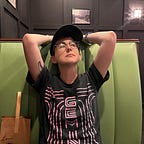The Art Monster at the End of This Book
Writer and diarist Anais Nin took the same liberties as her male peers — all of them, including the horrendous ones.
I first read Anais Nin when I was eighteen years old. It was 2000, and I had just started blogging, though no-one called it that back then — I kept a public “diary,” on a LiveJournal knockoff called OpenDiary.com, and had to learn hex codes and basic HTML to make it look the way I wanted, which was (I assure you) very ugly.
Anyway: I wanted my diary to be riveting for all five of my followers, so when I found a book about famous diaries in the dollar bin of a used bookstore, I picked it up. That book was no great shakes, and I can no longer recall its author or title, but somewhere — as an example of a particularly bad diary, in fact — the author reviewed the fourth volume of Nin’s seven-volume series The Diary of Anais Nin. The review included a capsule biography (underground writer, became a feminist icon in the ’70s, knew a lot of artists, dreamy and “poetic” and self-absorbed to a fault) which sparked my interest. I wanted to become an interesting person. Nin already was one, and she seemed to share my ideas about what an interesting person should be.
Of course, Nin was forty-something years old when she had those ideas, and I was…
